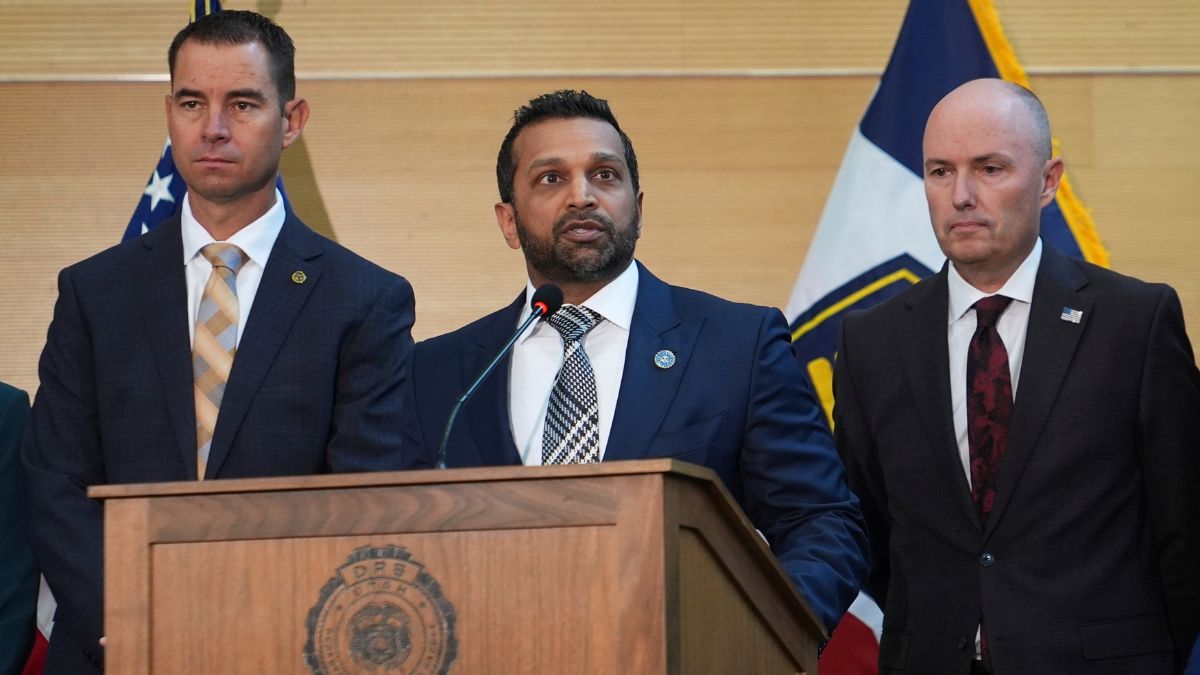The assassination of conservative activist Charlie Kirk on a Utah college campus has quickly evolved into a nationwide political controversy in the United States.
At the centre of this storm is Federal Bureau of Investigation (FBI) Director Kash Patel, whose actions during the fast-moving investigation have been sharply criticised by former FBI officials and political analysts.
What began as a high-profile murder probe has now raised deeper questions about the leadership and direction of the FBI under Patel’s tenure.
What Kash Patel did after the Charlie Kirk shooting
On September 10, Charlie Kirk, a well-known conservative commentator and activist with close ties to US President Donald Trump and senior administration officials, was shot and killed at Utah Valley University.
The killing immediately triggered shockwaves across the country, both because of Kirk’s prominence and because of the growing concern over political violence in America.
Law enforcement agencies at the local, state, and federal levels mobilised quickly to respond. Within hours, however, confusion began to swirl around the investigation, in part due to statements made by FBI Director Kash Patel.
On the evening of the shooting, Patel posted on X that “the subject” involved in Kirk’s assassination was already in custody.
This announcement turned out to be false.
Two individuals had been detained for questioning, but they were soon released, and Utah officials confirmed that the actual shooter remained at large.
At almost the same time that Patel was announcing an arrest, Utah Governor Spencer Cox gave a press conference making clear that the search for the suspect was ongoing.
“Whoever did this, we will find you,” Cox vowed, indicating that no one had been formally apprehended.
Later that evening, Patel posted a second update stating that the person in custody had been released following interrogation.
Editor’s Picks
Four former senior FBI officials later told NBC News that Patel’s early posts were ill-timed and unnecessary, arguing that they undermined public confidence in the bureau during a moment of national crisis.
Christopher O’Leary, a retired FBI counterterrorism official, delivered a blunt assessment of Patel’s handling of events, “He’s got zero leadership experience and capabilities.”
A current law enforcement official, speaking anonymously, said the tragedy highlighted Patel’s “public inability to meet the moment as a leader.”
Kash Patel’s dinner at Rao’s
While the search for the shooter was underway, questions also emerged about Patel’s personal whereabouts on the night of Kirk’s assassination.
Two sources familiar with the situation told NBC News that Patel dined at Rao’s, an exclusive and notoriously difficult-to-book restaurant in New York City, just hours after the shooting.
Rao’s opens at 7 pm, and at 6:21 pm, Patel posted on X announcing the supposed arrest of a suspect. Roughly 90 minutes later, at 7:59 pm, he posted again to say that the individual had been released.
It remains unclear whether Patel was physically at the restaurant when he made the second post.
Nonetheless, the optics of attending a high-end dinner while the investigation unfolded drew criticism from former bureau officials and observers.
“He has heard concerns about how this looks,” one administration official said, noting that there were “a lot of shaking heads” within the government about Patel’s choices that evening.
How Patel handled the Charlie Kirk investigation
By the next morning on September 11, tensions within the FBI were escalating. According to multiple law enforcement and Trump administration officials, Patel and his deputy, Dan Bongino, held a conference call with agents to address the ongoing manhunt for the suspect.
The call, which was reportedly laced with profanity, reflected the pressure on the bureau to deliver quick results.
Patel expressed anger over what he saw as breakdowns in communication, particularly that he had not received images of the suspect quickly enough from the Salt Lake City field office.
Sources familiar with the exchange said Patel and Bongino made clear they were under intense pressure to arrest the killer as soon as possible.
The New York Times first reported details of the call, which highlighted the internal strain within the FBI at a moment of extreme public scrutiny.
Later that day, Patel attended ceremonies marking the anniversary of the September 11, 2001, attacks in New York before travelling to Utah to be closer to the investigation.
Two administration officials said Patel was explicitly advised not to make public comments or appear prominently at press conferences until a suspect had been arrested.
That evening, Patel attended a press conference alongside state and local officials but remained silent throughout, a decision one official later described as “the right call.”
How Kash Patel contradicted local law enforcement
On September 12, authorities arrested 22-year-old Tyler Robinson in connection with Kirk’s assassination.
The following day, Patel took to X once again, claiming that the FBI had played a decisive role in solving the case by pushing for the release of surveillance images of the suspect.
“Against all law enforcement recommendations, we demanded the video footage and enhanced stills of the suspect be released to the public,” Patel wrote.
“Robinson’s father, who ultimately turned him in to authorities, told law enforcement that he recognised his son in that released video.”
However, the Utah Department of Public Safety (DPS) publicly disputed Patel’s version of events. The agency said it had initially attempted to identify the suspect using facial recognition technology to protect innocent individuals who might resemble the shooter.
“We did not recommend they not be released, however we first used technology [facial recognition] to try to identify,” a DPS spokesperson said. “When that was unsuccessful we were fully supportive and in agreement we should release the photos.”
The statement pointed out that it was a “unified investigation” and put a spotlight on the lingering tensions between federal and local law enforcement over how the case was handled.
How White House reacted to the handling of the Charlie Kirk case
Despite the mounting criticism, the White House has continued to back Patel.
“Anyone who doubts his resolve and dedication — especially when Charlie was such a close friend to him — simply is using this extremely sad moment in a disgusting act of political gamesmanship,” a White House official said.
“The focus is justice, and this killer will face the full wrath of the justice system.”
Another senior White House official added that Trump personally praised Patel’s work, stating, “The president spoke on it this morning and said he thinks everyone has done an amazing job.”
How conservatives want Kash Patel gone
Patel’s handling of the investigation has been ridiculed by the far-right.
Conservative strategist Christopher Rufo publicly questioned Patel’s fitness to lead the bureau, writing that it was “time for Republicans to assess whether Kash Patel is the right man to run the FBI.”
The timing of the controversy is particularly significant because Patel is scheduled to testify before Congress on Tuesday and Wednesday, in two high-stakes oversight hearings.
These sessions were already expected to be contentious due to broader concerns about the FBI’s direction under Patel, but the fallout from the Kirk case has raised the stakes considerably.
Gregory Brower, the FBI’s former top congressional affairs official, highlighted the importance of Patel’s performance.
“Because of the scepticism that some members of the Senate have had and still have, it’s extremely important that he perform very well at these oversight hearings,” Brower said.
Democrats in Congress are expected to press Patel on whether his restructuring of the bureau has compromised its independence and effectiveness.
Meanwhile, Republicans are divided. Some strongly support Patel’s reforms and his alignment with Trump’s vision, while others — including voices within conservative circles — are openly questioning whether Patel is the right leader for the FBI during such a turbulent period.
How Patel’s vision for the FBI has led to internal turmoil
The crisis over the Kirk case comes on top of ongoing upheaval inside the FBI.
Three senior FBI executives have filed a lawsuit alleging they were wrongfully terminated in a politically motivated purge aimed at aligning the bureau with Trump administration priorities.
One of the plaintiffs, Brian Driscoll, a former acting FBI director, claimed he was dismissed after refusing to provide the US Justice Department with the names of agents who participated in investigations related to the January 6 Capitol riot.
Driscoll also alleged that he challenged efforts to fire an FBI pilot who had been falsely identified on social media as being part of the Mar-a-Lago classified documents search.
Over the past several months, numerous senior executives have either been pushed out, reassigned, or forced into early retirement.
The head of the Salt Lake City field office — a veteran counterterrorism investigator — was forced out just weeks before Kirk’s killing.
Since assuming the role of director, Patel has moved swiftly to reshape the FBI’s priorities.
Aligning closely with Trump’s agenda, Patel has elevated the fight against violent street crime, drug trafficking, and illegal immigration. Thousands of arrests have been made as part of these initiatives, many involving immigration violations.
Patel has defended this approach, saying it reflects his philosophy of empowering law enforcement. Supporters argue this focus restores order in cities grappling with high crime rates.
However, critics warn that diverting resources away from the bureau’s traditional focus on corruption and national security could weaken its ability to address sophisticated threats.
At the same time, Patel and US Attorney General Pam Bondi have launched politically sensitive investigations into former top intelligence and law enforcement officials, including former FBI Director James Comey and former CIA Director John Brennan.
Some observers see these new investigations as an attempt to reshape the narrative and redirect attention from past controversies, especially involving Trump.
Also Watch:
With inputs from agencies
End of Article

)

